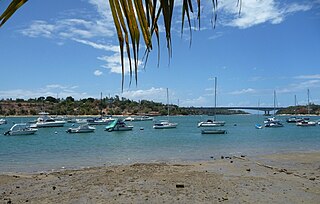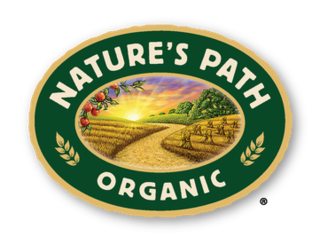Related Research Articles

The cocoa bean or simply cocoa, also called the cacao bean or cacao, is the dried and fully fermented seed of Theobroma cacao, from which cocoa solids and cocoa butter can be extracted. Cocoa beans are the basis of chocolate, and Mesoamerican foods including tejate, an indigenous Mexican drink that also includes maize.

A farmer is a person engaged in agriculture, raising living organisms for food or raw materials. The term usually applies to people who do some combination of raising field crops, orchards, vineyards, poultry, or other livestock. A farmer might own the farmed land or might work as a laborer on land owned by others, but in most developed economies, a farmer is usually a farm owner, while employees of the farm are known as farm workers, or farmhands. However, in other older definitions a farmer was a person who promotes or improves the growth of plants, land or crops or raises animals by labor and attention.
The Green Belt Movement (GBM) is an indigenous, grassroots, non-governmental organization based in Nairobi, Kenya, that takes a holistic approach to development by focusing on environmental conservation, community development and capacity building. Professor Wangari Maathai established the organization in 1977, under the auspices of the National Council of Women of Kenya.
Agribusiness refers to the enterprises, the industry, the system, and the field of study of the interrelated and interdependent value chains in agriculture and bio-economy. The primary goal of agribusiness is to maximize profit while sustainably satisfying the needs of consumers for products related to natural resources such as biotechnology, farms, food, forestry, fisheries, fuel, and fiber — usually with the exclusion of non-renewable resources such as mining.
Social Venture Network (SVN) is a nonprofit membership organization composed of a multitude of various business leaders who strive to create a more just and sustainable world. Founded in 1987 by Joshua Mailman, Thomas H. Stoner Jr., and Wayne Silby, SVN encompasses around 500 national and international leaders of both for-profit and non-profit sustainable enterprises. Those in the for-profit space are also recognized as companies dedicated to a triple bottom line: people, planet, and profit.

Kilifi is a town on the coast of Kenya, 56 kilometres (35 mi) northeast by road of Mombasa. The town lies on the Kilifi Creek and sits on the estuary of the Goshi River. Kilifi is capital of the Kilifi County and has a population of 122,899.

A smallholding or smallholder is a small farm operating under a small-scale agriculture model. Definitions vary widely for what constitutes a smallholder or small-scale farm, including factors such as size, food production technique or technology, involvement of family in labor and economic impact. Smallholdings are usually farms supporting a single family with a mixture of cash crops and subsistence farming. As a country becomes more affluent, smallholdings may not be self-sufficient, but may be valued for the rural lifestyle. As the sustainable food and local food movements grow in affluent countries, some of these smallholdings are gaining increased economic viability. There are an estimated 500 million smallholder farms in developing countries of the world alone, supporting almost two billion people.
The coffee industry of Kenya is noted for its cooperative system of production, processing, milling, marketing, and auction system. About 70% of Kenyan coffee is produced by small- scale holders. It was estimated in 2012 that there were about 150,000 coffee farmers in Kenya and other estimates are that six million Kenyans were employed directly or indirectly in the coffee industry. The major coffee-growing regions in Kenya are the high plateaus around Mount Kenya, the Aberdare Range, Kisii, Nyanza, Bungoma, Nakuru, Kericho and to a smaller scale in Machakos and Taita hills in Eastern and coast provinces respectively..

In New York City, there is an extensive water supply system that supports several programs and infrastructure pertaining to the city's food supply. City officials, agencies, and organizations cooperate with rural farmers to grow food more locally, as well as protect waterways in the New York metropolitan area. The New York City Department of Education operates a school-time and summertime breakfast/lunch program. However, New York City is also deprived of supermarkets in several neighborhoods, and the city has combatted this issue by allowing extra street vendors to operate in the city. To encourage food safety, New York City also has a restaurant-grading system that it introduced in 2010. Because of its various food programs, New York City has become a model for food systems internationally.
One Acre Fund is a nonprofit organization that supplies smallholder farmers in East Africa with asset-based financing and agriculture training services to reduce hunger and poverty. Headquartered in Kakamega, Kenya, the organization works with farmers in rural villages throughout Kenya, Rwanda, Burundi, Tanzania, Uganda, Malawi, Nigeria, Zambia, Ethiopia, and India.
Animal-free agriculture,, consists of farming methods that do not use animals or animal products.

Trees for the Future is a Maryland-based nonprofit organization founded on April 12, 1989, that helps communities around the world plant trees. Through seed distribution, agroforestry training, and in-country technical assistance, it has empowered rural groups to restore tree cover to their lands, protect the environment and help to preserve traditional livelihoods and cultures for generations.

Nature's Path Foods, commonly known as Nature's Path, is a privately held, family-owned producer of certified organic foods. Originally known for its breakfast cereals, it now has a portfolio of more than 150 products. Founded in 1985 by Arran and Ratana Stephens, Nature's Path employs approximately 500 people, with manufacturing facilities in Canada and the United States and sales in more than 40 countries. All of its products are vegetarian, certified organic, and Non-GMO Project Verified. Nature's Path is a triple bottom line social enterprise, and has been recognized for incorporating the notion of sustainability into its business practices through its support of various charitable and eco-friendly initiatives. The company is regularly named one of Canada's best employers.

Farm-to-table is a social movement which promotes serving local food at restaurants and school cafeterias, preferably through direct acquisition from the producer. This might be accomplished by a direct sales relationship, a community-supported agriculture arrangement, a farmer's market, a local distributor or by the restaurant or school raising its own food. Farm-to-table often incorporates a form of food traceability where the origin of the food is identified to consumers. Often restaurants cannot source all the food they need for dishes locally, so only some dishes or only some ingredients are labelled as local.
Farm Builders is a social enterprise in Liberia with the mission of building great farms which create prosperity for smallholder farmers now and in future generations. Farm Builders is headquartered in Kakata District in the Republic of Liberia. Farm Builders has received prestigious awards for social innovation from the Echoing Green and the Mulago Foundation. Willian Lyons Morris, Sergio Pancorbo, Mima Nedelcovych, Nelson Hill, Morris Neasain, Brian Caouette, and Isaac Smith are amongst the core Farm Builders start up team.
ALTIS – Graduate School Business & Society is a School for graduate students of the Università Cattolica del Sacro Cuore in Milan, Italy. The school offers MBA programs, specializing masters and many executive education programs.
Sylvia Banda is a Zambian business woman, restaurateur and social entrepreneur. She is an Ashoka fellow. Banda promotes local food use, choosing ingredients for her restaurant from local and small-scale farms. She started her own business, Sylva Professional Catering in 1986. By 2009, she had 16 restaurants in Lusaka. In 2014, she invested $105,000 in US dollars to open a food processing plant in Zambia.

Charles Mutua Mully is the founder and chief executive officer of Mully Children's Family (MCF), a Christian, non-governmental organization based in Kenya that works with disadvantaged populations. Mully is the subject of the documentary film Mully, directed by Scott Haze, which was released in October 2017.

Rose Goslinga is a microinsurer and advocate for creating insurance for small-scale farmers in Africa. Goslinga led the development of the Syngenta Foundation's Kilmo Salam program which provides lost cost insurance to nearly 200,000 farmers in Kenya and Rwanda. In 2012, Goslinga became a fellow at the Mulago Foundation.

Treedom is a platform that allows anyone to plant trees in different countries of the world. Treedom also allows the 'owner's of the planted trees to receive images of the trees that have just been planted along with its GPS coordinates and updates from the project it is part of.
References
- ↑ "Komaza website". Komaza.com. Retrieved 2017-04-24.
- ↑ "Popcasts : Tevis Howard: Microforestry". PopTech. Retrieved 2012-02-21.
- ↑ "Forbes ASAP". Forbes.com. Retrieved 2017-04-24.
- ↑ Archived February 2, 2010, at the Wayback Machine
- ↑ "Fast Company". fastcompany.com. Retrieved 2017-04-24.
- ↑ Archived January 16, 2010, at the Wayback Machine
- ↑ "Komaza (portfolio page)". Mulago Foundation . Retrieved 2012-08-14.
- ↑ "SVN". SVN. Archived from the original on 2021-12-15. Retrieved 2017-04-24.
- ↑ "Ashoka". Ashoka. Retrieved 2017-04-24.
- ↑ "Forbes 30 under 30 social entrepreneurs (2014)". Forbes. Archived from the original on March 15, 2014. Retrieved 2017-04-24.
- ↑ "Tevis Howard turns his passion from science to fighting poverty in Kenya through a self-started microforestry program". Abroadview.org. Archived from the original on 2012-02-20. Retrieved 2012-02-21.
- ↑ "San Francisco Man Poised To Expand Decade-Long Effort To Help World's Poorest". NBCBayArea.com. Retrieved 2017-04-24.
- ↑ "Our Solution". KOMAZA. Archived from the original on 2011-03-03. Retrieved 2012-02-21.
- ↑ "Komaza Plants Sustainable Microforestry in Kenya". TriplePundit.com. Retrieved 2017-04-24.
- ↑ "Accomplishments". KOMAZA. Archived from the original on 2011-04-26. Retrieved 2012-02-21.